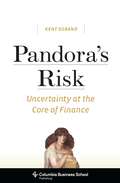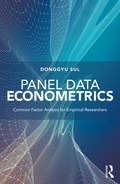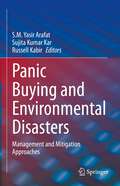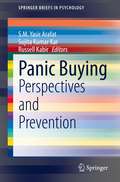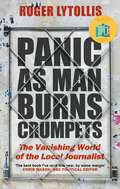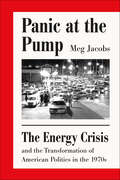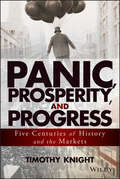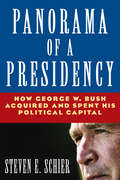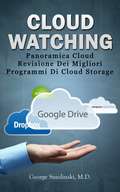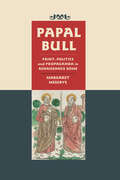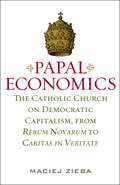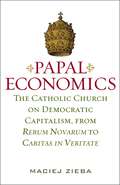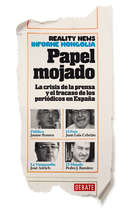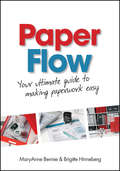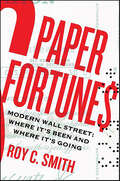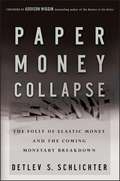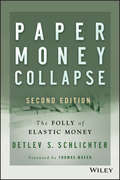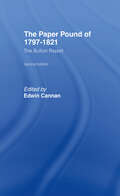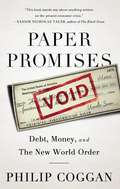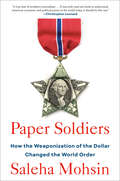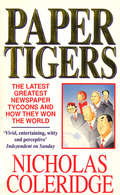- Table View
- List View
Pandora’s Risk: Uncertainty at the Core of Finance (Columbia Business School Publishing)
by Kent OsbandAuthor of the acclaimed work Iceberg Risk: An Adventure in Portfolio Theory, Kent Osband argues that uncertainty is central rather than marginal to finance. Markets don't trade mainly on changes in risk. They trade on changes in beliefs about risk, and in the process, markets unite, stretch, and occasionally defy beliefs. Recognizing this truth would make a world of difference in investing. Belittling uncertainty has created a rift between financial theory and practice and within finance theory itself, misguiding regulation and stoking huge financial imbalances.Sparking a revolution in the mindset of the investment professional, Osband recasts the market as a learning machine rather than a knowledge machine. The market continually errs, corrects itself, and makes new errors. Respecting that process, without idolizing it, will promote wiser investment, trading, and regulation. With uncertainty embedded at its core, Osband's rational approach points to a finance theory worthy of twenty-first-century investing.
Panel Data Econometrics: Common Factor Analysis for Empirical Researchers
by Donggyu SulIn the last 20 years, econometric theory on panel data has developed rapidly, particularly for analyzing common behaviors among individuals over time. Meanwhile, the statistical methods employed by applied researchers have not kept up-to-date. This book attempts to fill in this gap by teaching researchers how to use the latest panel estimation methods correctly. Almost all applied economics articles use panel data or panel regressions. However, many empirical results from typical panel data analyses are not correctly executed. This book aims to help applied researchers to run panel regressions correctly and avoid common mistakes. The book explains how to model cross-sectional dependence, how to estimate a few key common variables, and how to identify them. It also provides guidance on how to separate out the long-run relationship and common dynamic and idiosyncratic dynamic relationships from a set of panel data. Aimed at applied researchers who want to learn about panel data econometrics by running statistical software, this book provides clear guidance and is supported by a full range of online teaching and learning materials. It includes practice sections on MATLAB, STATA, and GAUSS throughout, along with short and simple econometric theories on basic panel regressions for those who are unfamiliar with econometric theory on traditional panel regressions.
Panic Buying and Environmental Disasters: Management and Mitigation Approaches
by S. M. Yasir Arafat Sujita Kumar Kar Russell KabirPanic buying is a common response during crises; however, to date it has been a significantly under-researched area. Recent evidence suggests that an environmental stimulus, such as the COVID-19 pandemic, war, earthquakes, flooding, public health emergencies (SARS, MARS) can trigger this phenomenon. As an environmental crisis takes its toll, the understanding of panic buying becomes overlooked. Nevertheless, panic buying causes series of events separate from these primary events. Understanding the management of emergencies and disasters should be an integral part of dealing with panic buying since every major environmental crisis has the potential to initiate panic buying behaviour in the general public. This book will analyse episodes of panic buying and major environmental crisis focusing on specific prevention strategies. This book is the first of its kind of approach to join up the management of panic buying during a public health emergency.
Panic Buying: Perspectives and Prevention (SpringerBriefs in Psychology)
by S. M. Yasir Arafat Sujita Kumar Kar Russell KabirThis brief provides a thorough overview of the history and underlying motivations for consumer panic buying, evaluating psychological perspectives on this behavior on both an individual and societal level. The first volume of its kind to focus specifically on the topic of panic buying, the book situates its analysis within the context of the modern COVID-19 pandemic as well as in a broader psychology context. Chapters encompass a variety of interdisciplinary perspectives, incorporating insights from consumer psychology, marketing, sociology, and public health. Finally, contributors discuss the long-term implications of panic buying and potential prevention strategies. Panic Buying: Perspectives and Prevention will be a useful reference for researchers and students in consumer psychology, as well as those interested emergency preparedness, and supply chain management. First volume of its kind to focus specifically on the consumer behavior of panic buyingAnalyzes panic buying behavior in the context of the modern COVID-19 pandemic as well as within a broader psychology contextProvides a multidisciplinary analysis of panic buying, including perspectives from consumer psychology, social psychology, marketing, emergency preparedness, and public health.
Panic as Man Burns Crumpets: The Vanishing World of the Local Journalist
by Roger Lytollis'For those who know about provincial newspapers, this will be a classic and a gem. Those who don't know will envy what they have missed' MELVYN BRAGG'Brisk and entertaining. A very readable love letter to a disappearing world, told with verve and tenderness' STUART MACONIE, author of Pies and Prejudice'Gut-bustingly funny, poignant and packed with astonishing insider information'M. W. CRAVEN, author of the award-winning The Puppet ShowYou dreamed of being a journalist and the dream has come true. You love working for your local paper . . . although not everything is as you imagined.You embarrass yourself with a range of celebrities, from John Hurt to Jordan. Your best story is 'The Man With the Pigeon Tattoo'.A former colleague interviews President Trump. You urinate in the president of the Mothers' Union's garden. Your appearance as a hard-hitting columnist on a BBC talk show does not go well. And being photographed naked is only the second most humiliating thing to happen one infamous afternoon. There are serious stories, such as a mass shooting, a devastating flood, and the search for Madeleine McCann.Meanwhile local papers are dying. Your building is crumbling and your readership is dwindling. Your carefully crafted features are read by fewer people than a story about fancy dress for dogs. Panic as Man Burns Crumpets is the inside story of local newspapers during the past twenty-five years, told in a way that's funny, poignant and revealing.
Panic as Man Burns Crumpets: The Vanishing World of the Local Journalist
by Roger Lytollis'For those who know about provincial newspapers, this will be a classic and a gem. Those who don't know will envy what they have missed' MELVYN BRAGG'Brisk and entertaining. A very readable love letter to a disappearing world, told with verve and tenderness' STUART MACONIE, author of Pies and Prejudice'Gut-bustingly funny, poignant and packed with astonishing insider information'M. W. CRAVEN, author of the award-winning The Puppet Show'Local journalism has never seemed more exotic than in this part-memoir, part-ode to that disappearing art, which is as funny as it is endearing . . . Told with a tender fondness, the bonkers, baffling but vital world of local press is paraded with the style that it deserves'JONATHAN WHITELAW, Sun'Refreshingly honest, engagingly self-deprecating, tremendously funny and more than a little heartbreaking. By far my favourite read of the year so far'MIKE WARD, TV editor, Daily Express/Daily Star 'Local publishers . . . need to hold on to thoughtful, dedicated writers such as Roger Lytollis, or his book will be an epitaph to a centuries-old industry'IAN BURRELL, i paper'Anyone who has ever worked at a local newspaper, or wondered what it is like, should read this book'DOMINIC PONSFORD, media editor at New Statesman Media Group/editor-in-chief at Press Gazette'[Lytollis] writes with clarity, comically self-effacing honesty and surprising poignancy . . . [this is] the story of what it is like to love what you do, and be great at it, and to watch it collapse around you in slow motion' ROBYN VINTER, GuardianYou dreamed of being a journalist and the dream has come true. You love working for your local paper . . . although not everything is as you imagined.You embarrass yourself with a range of celebrities, from John Hurt to Jordan. Your best story is 'The Man With the Pigeon Tattoo'.A former colleague interviews President Trump. You urinate in the president of the Mothers' Union's garden. Your appearance as a hard-hitting columnist on a BBC talk show does not go well. And being photographed naked is only the second most humiliating thing to happen one infamous afternoon. There are serious stories, such as a mass shooting, a devastating flood, and the search for Madeleine McCann.Meanwhile local papers are dying. Your building is crumbling and your readership is dwindling. Your carefully crafted features are read by fewer people than a story about fancy dress for dogs. Panic as Man Burns Crumpets is the inside story of local newspapers during the past twenty-five years, told in a way that's funny, poignant and revealing.
Panic at the Pump: The Energy Crisis and the Transformation of American Politics in the 1970s
by Meg JacobsAn authoritative history of the energy crises of the 1970s and the world they wroughtIn 1973, the Arab OPEC cartel banned the export of oil to the United States, sending prices and tempers rising across the country. Dark Christmas trees, lowered thermostats, empty gas tanks, and the new fifty-five-mile-per-hour speed limit all suggested that America was a nation in decline. “Don’t be fuelish” became the national motto. Though the embargo would end the following year, it introduced a new kind of insecurity into American life—an insecurity that would only intensify when the Iranian Revolution led to new shortages at the end of the decade.As Meg Jacobs shows, the oil crisis had a decisive impact on American politics. If Vietnam and Watergate taught us that our government lied, the energy crisis taught us that our government didn’t work. Presidents Nixon, Ford, and Carter promoted ambitious energy policies that were meant to rally the nation and end its dependence on foreign oil, but their efforts came to naught. The Democratic Party was divided, with older New Deal liberals who prized access to affordable energy squaring off against young environmentalists who pushed for conservation. Meanwhile, conservative Republicans argued that there would be no shortages at all if the government got out of the way and let the market work. The result was a political stalemate and panic across the country: miles-long gas lines, Big Oil conspiracy theories, even violent strikes by truckers.Jacobs concludes that the energy crisis of the 1970s became, for many Americans, an object lesson in the limitations of governmental power. Washington proved unable to design an effective national energy policy, and the result was a mounting skepticism about government intervention that set the stage for the rise of Reaganism. She offers lively portraits of key figures, from Nixon and Carter to the zealous energy czar William Simon and the young Donald Rumsfeld and Dick Cheney. Jacobs’s absorbing chronicle ends with the 1991 Gulf War, when President George H. W. Bush sent troops to protect the free flow of oil in the Persian Gulf. It was a failure of domestic policy at home that helped precipitate military action abroad. As we face the repercussions of a changing climate, a volatile oil market, and continued turmoil in the Middle East, Panic at the Pump is a necessary and lively account of a formative period in American political history.
Panic, Prosperity, and Progress: Five Centuries of History and the Markets (Wiley Trading)
by Timothy KnightA detailed guide to financial market performance during financial crises With the financial markets seemingly careening from one crisis to another, it's vital for today’s investors and traders to have an historical perspective on market performance during times of great turmoil. In this book, Tim Knight provides an exhaustive analysis of financial market behavior prior, during, and following tumultuous events since 1600. Making copious use of charts and basic technical analysis, Knight demonstrates how external shocks tend to create extreme reactions in the financial markets and how these predictable reactions provide opportunities for investors and traders to profit. Knight traverses five centuries of financial market history, from Tulipmania in the 1600s to the contemporary sovereign debt crisis. He looks at each event from the prism of the financial markets, examining the market climate prior to the event, during the event, and following the event. Draws essential lessons from history providing investors and traders with guidelines to better navigate markets in today's tumultuous times Offers valuable insights on understanding and anticipating market responses to shocks and crises Companion website with a Q&A section contains charts from key moments in past financial crises and asks readers to choose whether to go long, short, or step aside If you're looking for a better way to make it today's dynamic markets, look no further than this timely book.
Panonomics: A 4.0 System to Save Us from Ourselves
by Clare DevaneyThis book presents a vision for a new and holistic organisational system and paradigm—panonomics. Panonomics proposes a comprehensive understanding of ‘place’ and an expansive understanding of ‘time’ as the foundational framework for a new system. Presented as a fitting response to a pandemic and in support of progress through the 4.0 age, panonomics asserts an onward and upward directionality towards a shared mission of human survival and planetary sustainability, characterised as the continuous accumulation of time. While ambitious in both scope and proposals, the book sets out a theoretical context and framework, modelling how the principles of panonomics can be applied to current and emerging policy and asserting that, through expanding and extending our understandings of key concepts such as place, time and innovation, we can break free from the confines of current and regressive economic structures, systems and institutions to reset, reframe and advance collectively towards a ‘future now’.
Panorama of a Presidency: How George W. Bush Acquired and Spent His Political Capital
by Steven E SchierAs the controversial presidency of George W. Bush draws to a close, this work provides the first dispassionate, even-handed assessment of Bush's years in office. Widely respected scholar and author Steven E. Schier goes beyond the perspective of contemporary political commentary, and draws on wide-ranging literature about presidential history and strategy to carefully identify both the unique and the familiar aspects of George W. Bush's presidency. "Panorama of a Presidency" examines Bush's innovative electoral and governing strategies, ambitious foreign and domestic policy initiatives, and the bitterly divisive consequences of his mode of governance. As the first analysis to place the George W. Bush presidency in a broad historical and theoretical context, the book will be an essential foundation for any future studies on the topic.
Panoramica Cloud
by George Smolinski Arabela SoloneanDescrizione del libro: Hai bisogno di un modo migliore per organizzare la tua vita. Questo libro ti farà vedere come! Negli ultimi dieci anni, le rivoluzioni tecnologiche hanno permesso di migliorare drasticamente la velocità e l'efficienza con cui operiamo. Una rivoluzione importante è stato l'avvento del cloud storage, che consente la memorizzazione di documenti, file, video, foto e altro ancora nel "cloud". Non più abbiamo bisogno di mantenere i file sul computer o in armadi, per ora possiamo semplicemente metterli in questi programmi di cloud storage con un semplice clic del mouse. Insieme a tutte le nuove tecnologie, le domande sorgono sempre su quale programma è migliore, ha la massima funzionalità, ed è il più sicuro. Questo libro risponde a queste domande per i primi programmi di cloud storage oggi disponibili: 1. Google Drive 2. Evernote 3. Dropbox 4. Amazon Cloud Drive 5. Microsoft OneDrive In questo libro, troverete informazioni dettagliate su questi programmi, così come alcuni consigli utili su come massimizzare l'utilizzo di Google Drive e troverete anche i dettagli su altri programmi top come Evernote e gli elementi essenziali Evernote di cui avete bisogno per massimizzare tale piattaforma. Alla fine delle recensioni di singoli programmi, offro un confronto punto per punto di questi programmi di cloud storage e le mie raccomandazioni finali. Cloud storage è qui per rimanere, è un modo efficace per massimizzare la produttività e liberare la vostra vita. Comprando questo libro, prenderete una decisione su quali programmi di cloud storage utilizzare, e sbloccare questa tecnologia per voi!
Pantheon Ventures in 2019
by Victoria Ivashina Tonia LabruyereThe case discusses the strategy of Pantheon, a UK-based fund of funds investing in private equity. Client demands and preferences had changed in the aftermath of the 2008 global financial crisis and Pantheon had to adapt its business model to accommodate requests for new asset classes and customized portfolios. The challenge was to keep an eye on the fee structure, as clients also put pressure on the costs. Pantheon had extended its offer into infrastructure, real assets, and private debt, and had found a way to offer customized portfolio solutions at an acceptable cost level, but the very long-term nature of private asset classes was making it difficult to assess the success of this strategic turnaround.
Papal Bull: Print, Politics, and Propaganda in Renaissance Rome (Singleton Center Books in Premodern Europe)
by Margaret MeserveHow did Europe's oldest political institution come to grips with the disruptive new technology of print?Printing thrived after it came to Rome in the 1460s. Renaissance scholars, poets, and pilgrims in the Eternal City formed a ready market for mass-produced books. But Rome was also a capital city—seat of the Renaissance papacy, home to its bureaucracy, and a hub of international diplomacy—and print played a role in these circles, too. In Papal Bull, Margaret Meserve uncovers a critical new dimension of the history of early Italian printing by revealing how the Renaissance popes wielded print as a political tool. Over half a century of war and controversy—from approximately 1470 to 1520—the papacy and its agents deployed printed texts to potent effect, excommunicating enemies, pursuing diplomatic alliances, condemning heretics, publishing indulgences, promoting new traditions, and luring pilgrims and their money to the papal city. Early modern historians have long stressed the innovative press campaigns of the Protestant Reformers, but Meserve shows that the popes were even earlier adopters of the new technology, deploying mass communication many decades before Luther. The papacy astutely exploited the new medium to broadcast ancient claims to authority and underscore the centrality of Rome to Catholic Christendom. Drawing on a vast archive, Papal Bull reveals how the Renaissance popes used print to project an authoritarian vision of their institution and their capital city, even as critics launched blistering attacks in print that foreshadowed the media wars of the coming Reformation. Papal publishing campaigns tested longstanding principles of canon law promulgation, developed new visual and graphic vocabularies, and prompted some of Europe's first printed pamphlet wars. An exciting interdisciplinary study based on new literary, historical, and bibliographical evidence, this book will appeal to students and scholars of the Italian Renaissance, the Reformation, and the history of the book.
Papal Economics
by Maciej Zieba"For a long time to come, this book may well be the definitive work on the economic teaching of the modern popes." --MICHAEL NOVAKThe Catholic Church has long been one of the most important--but least understood--authorities on capitalism and democracy.The confusion and controversy didn't begin with Pope Francis. For well over a century popes have offered profound reflections on the economic and political order in their social encyclicals. But this estimable intellectual tradition has often been misunderstood, with partisan groups variously proclaiming Catholic social teaching to be left-wing or right-wing, pro-socialist or pro-capitalist or even pro-"third way."Papal Economics corrects the record. Father Maciej Zieba's incisive analysis shows that the Church displays a profound understanding of democracy and--perhaps more surprising--strong support for free markets. As Father Zieba demonstrates, popes have explicitly rejected socialism while praising a democratic state and market economy.Of course, this praise is not unqualified. Papal Economics shows how the Church, especially through John Paul's teachings, distinguishes true democracy from false, and praiseworthy capitalism from the kind to be rejected. Moving beyond the narrow confines of secular discourse, Catholic social teaching highlights the dangers that arise when the market and the state are elevated to absolutes in themselves--when man's spiritual dimensions are subordinated to his material ones. Ultimately, anyone who cares about free markets and democracy must understand, and defend, the foundations on which they are built. For as John Paul suggested, in a world without truth, freedom loses its meaning, the market loses its efficiency, and democracy yields to statism.
Papal Economics: The Catholic Church on Democratic Capitalism, from Rerum Novarum to Caritas in Veritate
by Maciej ZiebaPapal Economics corrects the record about one of the most important—but least understood—authorities on capitalism and democracy: the Catholic Church. Maciej Zieba, OP—a leading interpreter of the thought of Pope John Paul II—takes readers on an enlightening tour through the Catholic Church&’s social teaching on economics and governance. Examining papal pronouncements from the late nineteenth century to the present, Zieba shows that the Church displays a profound understanding of democracy and support for free markets. But this praise is not unqualified—a major reason why secular commentators of all stripes misinterpret Catholic social teaching. Updated with a brand-new afterword explaining the controversial economic teachings of Pope Francis, Papal Economics is the essential book for understanding the proper path forward.
Papel mojado: Reality News/mongolia
by MongoliaUn extraordinario ensayo sobre la crisis de la prensa y el fracaso de los periódicos en España. En los últimos años, la combinación de una crisis económica sin precedentes y el advenimiento de la era digital han creado una tormenta perfecta que parece haber herido de muerte a la prensa escrita, sin que ningún periódico esté a salvo, desde los diarios gratuitos hasta las cabeceras más prestigiosas. Sin embargo, achacar a factores externos esta situación sería deshonesto; muchas decisiones equivocadas y estrategias suicidas han contribuido. La habitual opacidad de los medios a la hora de informar sobre sí mismos ha permitido mantener esos errores ocultos. Afortunadamente, la aparición de Mongolia, un medio nuevo e irreverente sin las ataduras del pasado, ha cambiado el escenario. Desde su sección «Reality news», Mongolia ha prestado singular atención a esta cuestión, vital para cualquier sociedad libre. Papel mojado recoge todo lo publicado e incorpora material nuevo e inédito.
Paper Flow: Your Ultimate Guide to Making Paperwork Easy
by Brigitte Hinneberg Maryanne BennieTame your paperwork beast in just 10 minutes a day! Are you wasting your hard earned money on late fees and fines? Does your inbox look more like an outhouse? Do you lose precious time searching for receipts, forms, or other important documents? <P><P>Do you wonder what it would be like if you had a reliable, easy-to-use paper management system to restore order to your life? Stop wondering. The perfect guide for anyone who dreams of digging out from under their paperwork nightmare, Paper Flow arms you with a beautifully simple system for handling all the paper in your life. Never again will you waste valuable time on mad hunts through purses and pockets and piles of disparate papers for airline tickets, prescriptions, vouchers, invitations, phone numbers, or winning lottery tickets. With minimal effort, and just ten minutes a day, you'll conquer routine tasks like paying bills, handling correspondence, and filing. And you'll manage projects at home or work in less time than you ever thought possible. A simple, easy-to-use system for getting on top of your paperwork and keeping it organized and flowing A companion website features checklists, templates, plus a free program, The 28 Day Challenge, that helps you start bringing your paperwork beast to heel right away Provides a framework that allows you to create a system that's tailor-made for your needs and lifestyle
Paper Fortunes: Modern Wall Street; Where It's Been and Where It's Going
by Roy C. SmithA LONG, WILD RIDEPaper Fortunes is the richly-detailed story of Wall Street from post-war heyday to present woes, from a player whose experiences, profiles of the colorful personalities involved and learned observations of the forces shaping the business make it insightful and timely. Smith, a long-time Goldman Sachs banker and now a distinguished NYU professor of finance, enables anyone working on the Street, investing with it, or just appalled by its worst shenanigans to understand how the industry has grown, changed and evolved, and what its future prospects are. From various Goldmans, Sachses, and Lehmans through to Richard Fuld, Henry Paulson and Tim Geithner, Paper Fortunes tells the ongoing story of the shifting U.S. market economy through the actions of the people who've shaped it for the last 60 years and will shape it for the next 60 years.
Paper Money Collapse
by Detlev S. SchlichterThe case for the inevitable failure of a paper money economy and what that means for the futureAll paper money systems in history have ended in failure. Either they collapsed in chaos, or society returned to commodity money before that could happen. Drawing upon novel new research, Paper Money Collapse conclusively illustrates why paper money systems--those based on an elastic and constantly expanding supply of money as opposed to a system of commodity money of essentially fixed supply--are inherently unstable and why they must lead to economic disintegration.These highly controversial conclusions clash with the present consensus, which holds that elastic state money is superior to inflexible commodity money (such as a gold standard), and that expanding money is harmless or even beneficial for as long as inflation stays low. Contradicting this, Paper Money Collapse shows that:The present crisis is the unavoidable result of continuously expanding fiat moneyThe current policy of accelerated money production to "stimulate" the economy is counterproductive and could lead to a complete collapse of the monetary systemWhy many in financial markets, in media, and in the policy establishment are unable (and often unwilling) to fully appreciate the underlying problems with elastic moneyThis compelling new book looks at the breakdown of modern economic theory and the fallacy of mathematical models. It is an analysis of the current financial crisis and shows in very stark terms that the solutions presented by paper money-enthusiasts around the world are misguided and inherently flawed.
Paper Money Collapse
by Thomas Mayer Detlev S. SchlichterExplore the inevitable collapse of the fiat monetary system Paper Money Collapse: The Folly of Elastic Money, SecondEdition challenges the mainstream consensus on money andmonetary policy. While it is today generally believed that thetransition from 'hard' and inflexible commodity money (such as agold standard) to entirely flexible and potentially unlimited fiatmoney under national central banks allows for superior economicstability, Paper Money Collapse shows that the opposite istrue. Systems of highly elastic and constantly expanding money arenot only unnecessary, even for growing economies, they are alwaysextremely destabilizing. Over time, they must lead to substantialimbalances, including excessive levels of debt and distorted assetprices, that will require ever faster money production to sustain.Ultimately, however, there is no alternative to a completeliquidation of these distortions. Based on insights of manyrenowned economists and in particular of the Austrian School ofEconomics, the book explains through rigorous logic and in preciselanguage why our system of flexible fiat money is incompatible witha market economy and therefore unsustainable. Paper money systemshave always led to economic disintegration--withoutexception--throughout history. It will not be different forour system and we may be closer to the endgame than many think.The updated second edition incorporates:A new introduction and an extended outlook section thatdiscusses various "endgames"Responses to criticisms, alternative views, and a criticalassessment of 'solutions'Comments on recent policy trends, including attempts to exitthe 'easy money' policy modeAn evaluation of new crypto-currency BitcoinPaper Money Collapse: The Folly of Elastic Money, SecondEdition clarifies the problem of paper money clearly andeloquently, and proposes multiple routes to a solution.
Paper Pound, 1797-1812: A Reprint Of The Bullion Report
by Edwin CannanFirst Published in 1970. Routledge is an imprint of Taylor & Francis, an informa company.
Paper Promises: Debt, Money, and the New World Order
by Philip CogganFrom the "Economist"OCOs award-winning Buttonwood columnist comes a timely and incisive analysis of debt: the defining feature of our financial era
Paper Soldiers: How the Weaponization of the Dollar Changed the World Order
by Saleha Mohsin"Incisive debut treatise... Mohsin brings to the proceedings a reporter's eye for story" — Publisher's WeeklyFrom Bloomberg News reporter Saleha Mohsin, the untold story of how one of America&’s most invincible institutions—the Treasury—has used the U.S. dollar to define America&’s role in the world, and our economic future.In 1995, Treasury Secretary Robert Rubin re-defined the next thirty years of currency policy with the mantra, &“A strong dollar is in America&’s interest.&” That mantra held, ushering in exceptional prosperity and cheap foreign goods, but the strong dollar policy also played a role in the devastating hollowing out of America&’s manufacturing sector. Meanwhile, abroad, the United States increasingly turned to the dollar as a weapon of war. In Paper Soldiers, Saleha Mohsin reveals how the Treasury Department has shaped U.S. policy at home and overseas by wielding the American dollar as a weapon—and what that means in a new age of crisis.For decades, America has preferred its currency superpower-strong, the basis of a "strong dollar" policy that attracted foreign investors and pleased consumers. Drawing on Mohsin's unparalleled access to current and former Treasury officials like Robert Rubin, Steven Mnuchin, and Janet Yellen, Paper Soldiers traces that policy's intended and unintended consequences, including the rise of populist sentiment and trade war with China—culminating in an unprecedented attack on the dollar&’s pristine status during the Trump presidency—and connects the dollar's weaponization from 9/11 to the deployment of crippling financial sanctions against Russia. Ultimately, Mohsin argues that, untethered from many of the economic assumptions of the last generation, the power and influence of the American dollar is now at stake.With first-hand reporting and fresh analysis that illustrates the vast, often unappreciated power that the Treasury Department wields at home and abroad, Paper Soldiers tells the inside story of how we really got here—and the future not only of the almighty dollar, but the nation&’s teetering role as a democratic superpower.
Paper Tigers
by Nicholas ColeridgePaper Tigers is a riveting, authoritative and in-depth study of newspaper barons of the world – men and women who wield immense power, and whose ever-changing media empires make compelling case studies of business success and failure.From Rupert Murdoch to Robert Maxwell, Conrad Black to Lord Rothermere, Katharine Graham to Punch Sulzberger, Coleridge interviewed them all. The results confirm his status as a devastatingly astute observer of our times, one with few equals today.
Paper Trail
by Ellen GoodmanIn this rich and savvy collection of commentaries on the events, people and issues that shape and define our world, Pulitzer Prize-winning columnist and New York Times bestselling author Ellen Goodman cuts to the heart of the stories and controversies that helped to define our times. For over twenty-five years, nationally syndicated columnist Ellen Goodman has been training her lens on contemporary American life. A marvelously direct writer with keen insight into what makes the average American tick, laugh and occasionally boil with rage, Goodman takes her measure of the national psyche in a voice that is at once perceptive, witty and deeply humane. Paper Trail, her first collection in more than ten years, journeys through an era that has been golden in its advances and bleak in its disappointments. In a voice both reasoned and impassioned, she makes sense of the cultural debates that have captured our attention and sometimes become national obsessions. She wrestles with the close-to-the-bone issues of abortion, working mothers and gay marriage, the struggles for civil liberties and equal rights, and the moral complexity of assisted suicide and biotech babies. As she wends through the era of the Clinton scandals and the "amBushing" of America, the dot-com boom and bust, the horrors of September 11 and the War on Terrorism, Goodman pauses to celebrate some of our lost icons, including Jackie Onassis, Princess Diana and Doctor Spock. She reminds us as well of the fleeting fame of such instant celebrities as Elian Gonzalez and Lorena Bobbitt. The lines that separate public and private life dissolve under Goodman's scrutiny as she shows us how Washington politics, Silicon Valley technology and the national media culture infiltrate our jobs, relationships and minds. With the trademark clarity that readers count on, she walks us through the dilemmas posed by new technologies that range from cloning to cell phones and makes us laugh at the vagaries of Viagra and Botox and unreality TV. And in a world that sometimes seems to be stuck on fast forward, she holds on to values as timeless as a family Thanksgiving and a summer porch in Maine. Including more than 160 of Ellen Goodman's lively and stylish columns, this timely collection walks us along the paper trail in a voice that is both crystal clear and original.
